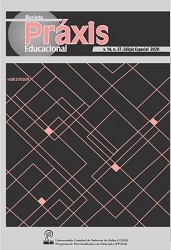TEORÍA DE MODELADO DE LA MENTE, PENSAMIENTO DIVERGENTE Y PLANTEAMIENTO DE PROBLEMAS MATEMÁTICOS DE PRIMER GRADO
DOI:
https://doi.org/10.22481/praxisedu.v16i37.6158Palabras clave:
Educación matemática, Planteamiento de problemas, Pensamiento divergente, Teoría de la menteResumen
Propósito: La presentación de problemas tiene una importancia central en la disciplina de las matemáticas y en la naturaleza del pensamiento matemático. El propósito de este estudio fue investigar las relaciones explicativas y predictivas entre las variables de la teoría de la mente, el pensamiento divergente y la presentación de problemas en los estudiantes de primer grado de la escuela primaria, utilizando el enfoque de modelado de ecuaciones estructurales. Método: Los sujetos son 345 estudiantes (176 niñas y 169 niños) de los alumnos de primer grado de la escuela primaria de Zahedan, utilizando el modelo de muestreo disponible. Vivieron y fueron educados en las áreas urbanas promedio de la ciudad. Los estudiantes respondieron a la teoría de la mente, el pensamiento divergente y las pruebas de planteamiento de problemas matemáticos. El modelado de ecuaciones estructurales se utilizó para analizar los datos recopilados en el instrumento de encuesta.Resultados: El análisis de datos reveló un impacto significativo (P <0.05) de la variable de pensamientoen el resultado de las habilidades para plantear problemas. Curiosamente, en este estudio se observó un impacto indirecto de la variable de la teoría de la mente a través del pensamiento divergente sobre la variable de planteamiento del problema. Estos hallazgos demostraron claramente los impactos positivos de los componentes del pensamiento divergente y la teoría de la mente sobre el problema matemático que plantea. Implicaciones para la investigación y la práctica: sigue siendo necesario explorar más a fondo el papel de la mente en la capacidad de plantear problemas con respecto a la educación matemática.
Descargas
Citas
Blazis P.P. (1987). Analysis of the state of mental discomfort in students dis .... cand. psychol. sciences. Leningrad, 182 p.
Geymans G. (1971). Psychology of a woman. SPb., 248 p.
Groysman AA (1988). Psychotherapeutic methods in the system of prophylaxis of neurotic disorders in students: Dis. ... Dr. honey. Science. L.,
Dubchak G.M. (2000). Intrapersonal conflicts of students during their studies at the university: Abstract. dis. ... cand. psychol. Sciences: Chernivtsi, 19 p.
Klimov E.A. (1996). Psychology of professional self-determination. M., 512s.
Kon I.S. (1975). Sexual differences and differentiation of social roles. In the book: Correlation of biological and social in a human being / Materials for a symposium in Moscow. M .: Enlightenment, p. 46
Kondratiev M.Yu. (1987). Management of the teaching staff. In the book .; Social Psychology: A manual for pedagogical universities. M .: Progress, p. 48
Kolesov D.V. (1980). Conversations about sex education. M .: Pedagogy, 102 p.
Kudryavtsev T.V. (1981). Psychological and pedagogical problems of higher education // Questions of Psychology, No. 2, p. 20-30
Lisovsky V.T., Dmitriev A.V. (1974). Student personality L.: Leningrad State University Publishing House, 184 p.
Markova AK (1996). Psychology of professionalism. M.: Education. 308 p.
Mukhina B.C. (1999). Phenomenology of the development and existence of personality. M., - V oronezh, 344 p.
Madorskaya S.M. (1986). The problem of social adaptation of students to the educational process: Dis. ... cand. philosopher, sciences. Minsk, 239 p
Stolin V.V. (1983). Self-identity. M .: Moscow Publishing House. university, 585 p.
Yanitsky M.S. (1995). The main psychological mechanisms for the adaptation of students to educational activities: Dis. ... cand. psychol. sciences. Kemerovo, 180 p.
Descargas
Publicado
Número
Sección
Licencia
Você é livre para:
Compartilhar - copia e redistribui o material em qualquer meio ou formato; Adapte - remixe, transforme e construa a partir do material para qualquer propósito, mesmo comercialmente. Esta licença é aceitável para Obras Culturais Livres. O licenciante não pode revogar essas liberdades, desde que você siga os termos da licença.
Sob os seguintes termos:
Atribuição - você deve dar o crédito apropriado, fornecer um link para a licença e indicar se alguma alteração foi feita. Você pode fazer isso de qualquer maneira razoável, mas não de uma forma que sugira que você ou seu uso seja aprovado pelo licenciante.
Não há restrições adicionais - Você não pode aplicar termos legais ou medidas tecnológicas que restrinjam legalmente outros para fazer qualquer uso permitido pela licença.












